Author Archives: borehead - Moderator
72 whales have died on the East Coast in a year. NOAA must take action.
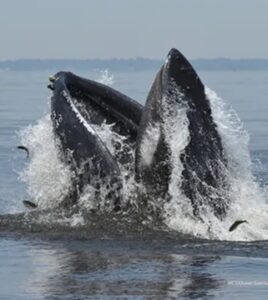 So, what have we learned from the recent whale deaths off the East Coast — 72 since December 2022? They have compelled local communities to question the risks and benefits of offshore wind. Sadly, these same deaths have revealed a disturbing lack of curiosity among the oil-companies-turned-offshore-wind-developers, the National Oceanic and Atmospheric Administration and even some marine scientists who rush to the cameras every time a whale dies to point fingers away from offshore wind development along the eastern seaboard. Proponents of offshore wind are quick to blame global warming (to which of course their solution is offshore wind turbines) moving feeding grounds into shipping lanes and general episodic “vessel strikes” for these deaths. Many hope to close the investigation within the same day or two because the last thing they need is to have two dead whales, less than 30 miles apart, stealing the headlines for a full week. Proponents of these systems are also quick to claim that offshore wind will not harm marine mammals, yet their own action seemingly contradicts that. >>click to read<< 16:49
So, what have we learned from the recent whale deaths off the East Coast — 72 since December 2022? They have compelled local communities to question the risks and benefits of offshore wind. Sadly, these same deaths have revealed a disturbing lack of curiosity among the oil-companies-turned-offshore-wind-developers, the National Oceanic and Atmospheric Administration and even some marine scientists who rush to the cameras every time a whale dies to point fingers away from offshore wind development along the eastern seaboard. Proponents of offshore wind are quick to blame global warming (to which of course their solution is offshore wind turbines) moving feeding grounds into shipping lanes and general episodic “vessel strikes” for these deaths. Many hope to close the investigation within the same day or two because the last thing they need is to have two dead whales, less than 30 miles apart, stealing the headlines for a full week. Proponents of these systems are also quick to claim that offshore wind will not harm marine mammals, yet their own action seemingly contradicts that. >>click to read<< 16:49
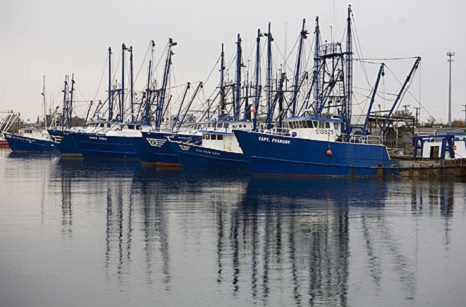
Breaking: Canastras buy vessels, permits from Blue Harvest bankruptcy
The owners of New Bedford’s seafood auction, closed a deal to buy out groundfish giant Blue Harvest Fisheries from bankruptcy, a move finalized Wednesday with the approval of a federal judge. After a short bidding war, Cassie Canastra submitted the highest bid of $12 million on Monday, beating out the second-highest bid from O’Hara Corporation, which is a part owner of New Bedford-based Eastern Fisheries, by $750,000. The sale includes “all the vessels, all the permits” that once belonged to Blue Harvest Fisheries. It includes eight vessels and 48 state and federal fishing permits, representing about 13% of all Northeast groundfish permits or about 250 million pounds of quota for the current fishing year. >>click to read<< 14:22
Harbour Grace shipyard enters creditor protection as owners face financial headwinds
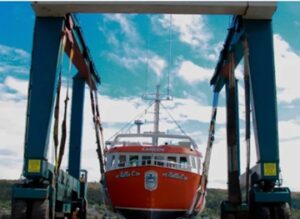 One of Newfoundland and Labrador’s largest shipyards, Harbour Grace Ocean Enterprises, has been granted court protection from its creditors as it struggles with a serious cash flow problem. The company is nearly $16 million in debt, and creditors have been demanding payment. Last week, the Supreme Court of Newfoundland and Labrador approved an order that temporarily protects the company from its creditors as it looks for a way forward. The court also appointed professional services firm PricewaterhouseCoopers to monitor the company. The shipyard employs 56 full-time employees and is described in court documents as “one of the largest marine vessel, repair, refit and construction businesses in Eastern Canada.” >>click to read<< 13:10
One of Newfoundland and Labrador’s largest shipyards, Harbour Grace Ocean Enterprises, has been granted court protection from its creditors as it struggles with a serious cash flow problem. The company is nearly $16 million in debt, and creditors have been demanding payment. Last week, the Supreme Court of Newfoundland and Labrador approved an order that temporarily protects the company from its creditors as it looks for a way forward. The court also appointed professional services firm PricewaterhouseCoopers to monitor the company. The shipyard employs 56 full-time employees and is described in court documents as “one of the largest marine vessel, repair, refit and construction businesses in Eastern Canada.” >>click to read<< 13:10
Industry welcomes confirmation that HPMA proposals have been scrapped
 The move was welcomed by the fishing industry which had campaigned against the proposal. Shetland Fishermen’s Association (SFA) executive officer Sheila Keith said members were pleased that common sense had prevailed. “The angst caused by the ill-conceived proposals was clear by the responses to the consultation which showed, when you removed campaign responses, 76 per cent of respondents opposed, and only 20 per cent supported the plans. “However, our concerns are not wholly alleviated as the government still discuss the implementation of “enhanced marine protection” over 10 per cent of Scottish waters. >>click to read<< 10:19
The move was welcomed by the fishing industry which had campaigned against the proposal. Shetland Fishermen’s Association (SFA) executive officer Sheila Keith said members were pleased that common sense had prevailed. “The angst caused by the ill-conceived proposals was clear by the responses to the consultation which showed, when you removed campaign responses, 76 per cent of respondents opposed, and only 20 per cent supported the plans. “However, our concerns are not wholly alleviated as the government still discuss the implementation of “enhanced marine protection” over 10 per cent of Scottish waters. >>click to read<< 10:19
Athearn Marine Agency Boat of the Week: 36’x14.5′ Novi Lobster Boat, 600HP, Scania D113 Diesel
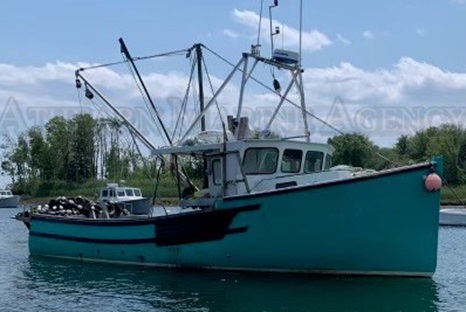 To review specifications, information, and 14 photos’, >click here<, To see all the boats in this series, >click here< 09:11
To review specifications, information, and 14 photos’, >click here<, To see all the boats in this series, >click here< 09:11
California commercial Dungeness crab fishing season delayed
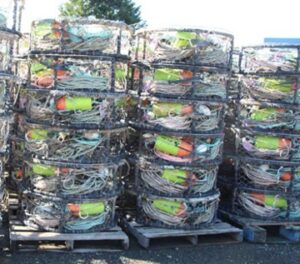 The California Department of Fish and Wildlife announced a delay in the season opener for California commercial Dungeness crab fishing off the Central and Southern Coast to protect whales from entanglement. The decision is based on a combination of excessive humpback whale entanglements in California Dungeness crab gear over the last three years and high numbers of recent humpback whale sightings off the central coast according to CDFW’s Risk Assessment and Mitigation Program criteria. Due to number of entanglements, NMFS is proposing to upgrade the California commercial Dungeness crab fishery to a Category I fishery,,, >>click to read<< 08:09
The California Department of Fish and Wildlife announced a delay in the season opener for California commercial Dungeness crab fishing off the Central and Southern Coast to protect whales from entanglement. The decision is based on a combination of excessive humpback whale entanglements in California Dungeness crab gear over the last three years and high numbers of recent humpback whale sightings off the central coast according to CDFW’s Risk Assessment and Mitigation Program criteria. Due to number of entanglements, NMFS is proposing to upgrade the California commercial Dungeness crab fishery to a Category I fishery,,, >>click to read<< 08:09
Man with rifle fires 2 shots across commercial fisherman’s bow off Florida Keys
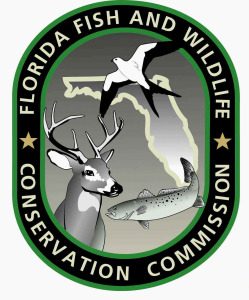 An argument between a recreational angler and a commercial fisherman off the Florida Keys nearly turned fatal Tuesday morning when the angler fired a rifle across the bow of the other man’s boat, police said. The incident happened around 9 a.m. on the oceanside of the Keys, about seven miles off Rodriguez Key, which is east of Key Largo, according to the Florida Fish and Wildlife Conservation Commission, the lead investigating agency. Arielle Cellender, an FWC spokeswoman, said the two men’s vessels were close to each other when they began arguing. >>click to read<< 07:01
An argument between a recreational angler and a commercial fisherman off the Florida Keys nearly turned fatal Tuesday morning when the angler fired a rifle across the bow of the other man’s boat, police said. The incident happened around 9 a.m. on the oceanside of the Keys, about seven miles off Rodriguez Key, which is east of Key Largo, according to the Florida Fish and Wildlife Conservation Commission, the lead investigating agency. Arielle Cellender, an FWC spokeswoman, said the two men’s vessels were close to each other when they began arguing. >>click to read<< 07:01
Two fishermen who disappeared at sea nine years ago drowned in tragic accident, coroner rules
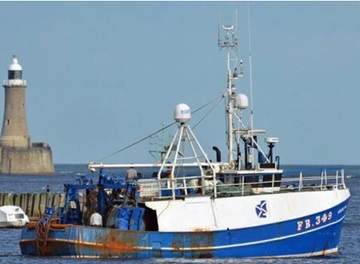 Two crew members drowned in a tragic accident when the boat they were fishing on sank in the North Sea, a coroner has ruled. Michael Pulpul, 38, and Jhunitzquo Antonio, 34, disappeared when the Ocean Way trawler which were were travelling on got into difficulty around 100 miles off the coast of Northumberland. The vessel sank on November 2, 2014 and their bodies have never been found. The pair, who were from the Philippines, were travelling with two other crew members from the same country – Rumulo Rocha and Nixon Ocon – and one of the boat’s skippers James Noble, 45. Mr Pulpul, Mr Antonio and Mr Noble lost their lives when the boat, which Mr Noble co-owned with fellow skipper Billy Edwards, capsized during adverse weather conditions. Photos, >>click to read<< 15:08
Two crew members drowned in a tragic accident when the boat they were fishing on sank in the North Sea, a coroner has ruled. Michael Pulpul, 38, and Jhunitzquo Antonio, 34, disappeared when the Ocean Way trawler which were were travelling on got into difficulty around 100 miles off the coast of Northumberland. The vessel sank on November 2, 2014 and their bodies have never been found. The pair, who were from the Philippines, were travelling with two other crew members from the same country – Rumulo Rocha and Nixon Ocon – and one of the boat’s skippers James Noble, 45. Mr Pulpul, Mr Antonio and Mr Noble lost their lives when the boat, which Mr Noble co-owned with fellow skipper Billy Edwards, capsized during adverse weather conditions. Photos, >>click to read<< 15:08
Fisheries and Oceans Canada doing a poor job of monitoring fishing industry: report
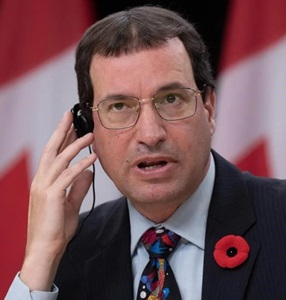 A new report slams the federal Fisheries Department for failing to properly monitor Canada’s commercial fishing industry. The report from the federal environment commissioner, Jerry DeMarco, says Fisheries and Oceans Canada lacks the ability to collect timely and dependable data about what is being caught. DeMarco says the dearth of reliable data means the department can’t protect Canada’s fish stocks from overfishing. The report from the federal environment commissioner, Jerry DeMarco, says Fisheries and Oceans Canada lacks the ability to collect timely and dependable data about what is being caught.>>click to read<< 13:02
A new report slams the federal Fisheries Department for failing to properly monitor Canada’s commercial fishing industry. The report from the federal environment commissioner, Jerry DeMarco, says Fisheries and Oceans Canada lacks the ability to collect timely and dependable data about what is being caught. DeMarco says the dearth of reliable data means the department can’t protect Canada’s fish stocks from overfishing. The report from the federal environment commissioner, Jerry DeMarco, says Fisheries and Oceans Canada lacks the ability to collect timely and dependable data about what is being caught.>>click to read<< 13:02
Lake Superior Herring Are Thriving for the First Time in Decades
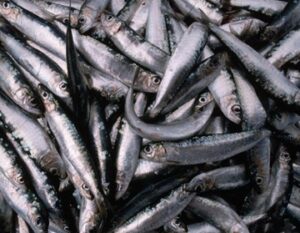 It’s an historic boom year for herring in Lake Superior, as a record number of the crucial fish appear to have survived to age one — a major developmental milestone. After decades of disappointing numbers, the huge swell of herring — a key facet of Lake Superior’s food web — could help bolster the ecosystem and fishing industry in the world’s second-largest freshwater lake. More herring can lead to healthier populations of those fish, a boon for commercial and recreational fishers. “It’s gonna change things for a long time to come in Lake Superior,” said Goldsworthy. >>click to read<< 12:14
It’s an historic boom year for herring in Lake Superior, as a record number of the crucial fish appear to have survived to age one — a major developmental milestone. After decades of disappointing numbers, the huge swell of herring — a key facet of Lake Superior’s food web — could help bolster the ecosystem and fishing industry in the world’s second-largest freshwater lake. More herring can lead to healthier populations of those fish, a boon for commercial and recreational fishers. “It’s gonna change things for a long time to come in Lake Superior,” said Goldsworthy. >>click to read<< 12:14
SNP fully scraps controversial fishing restrictions in final climbdown
 Scottish Government minister Màiri McAllan announced her party will no longer pursue divisive plans to restrict fishing in 10% of Scotland’s seas. The environmental policy aimed to protect sea life under threat but was met with a huge backlash from concerned rural and coastal communities. In June, Ms Allan said HPMAs would no longer be implemented on schedule by 2026 as government ministers went back to the drawing board. It came weeks after leading figures from the country’s seafood sector held a major protest outside Holyrood. Now Ms McAllan has revealed the proposals will be ditched entirely following the angry responses from fishing industry leaders opposed to the scheme. >>click to read<< 08:29
Scottish Government minister Màiri McAllan announced her party will no longer pursue divisive plans to restrict fishing in 10% of Scotland’s seas. The environmental policy aimed to protect sea life under threat but was met with a huge backlash from concerned rural and coastal communities. In June, Ms Allan said HPMAs would no longer be implemented on schedule by 2026 as government ministers went back to the drawing board. It came weeks after leading figures from the country’s seafood sector held a major protest outside Holyrood. Now Ms McAllan has revealed the proposals will be ditched entirely following the angry responses from fishing industry leaders opposed to the scheme. >>click to read<< 08:29
Lawsuit challenges new limits on offshore lobster traps
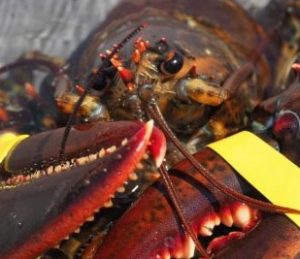 A New Hampshire lobster boat and a lobstermen’s association have filed a federal lawsuit to stop changes that would decrease the number of traps that can be used. The changes are for Area 3, which is about 30 miles offshore and runs up to the Canadian border down to the Carolinas. “That’s what this is supposed to be about, conservation of the resource,” Arthur “Sooky” Sawyer, president of the Massachusetts Lobstermen’s Association, said. Video, >>click to read<< 07:02
A New Hampshire lobster boat and a lobstermen’s association have filed a federal lawsuit to stop changes that would decrease the number of traps that can be used. The changes are for Area 3, which is about 30 miles offshore and runs up to the Canadian border down to the Carolinas. “That’s what this is supposed to be about, conservation of the resource,” Arthur “Sooky” Sawyer, president of the Massachusetts Lobstermen’s Association, said. Video, >>click to read<< 07:02
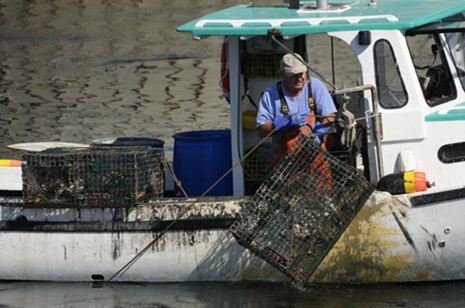
Lobstermen watching closely as federal regulators refine area for potential offshore wind
Lobster fishermen are watching closely as regulators continue to refine an area in the Gulf of Maine that could be used for offshore wind development, and they’re looking for more reassurances that the federal government will avoid popular fishing grounds. The federal Bureau of Ocean Energy Management has identified a 3.5 million acre draft area off the coasts of Maine, New Hampshire and Massachusetts that could be used for commercial offshore wind development. That proposed area excludes most of Lobster Management Area (LMA) 1, a popular offshore fishing area in Maine. But Zach Jylkka of the Bureau of Ocean Energy Management said some fishing grounds near or part of LMA 1 are still being studied and may be up for consideration, because they would be less expensive to develop. >>click to read<< 21:50
Maine: Electronic Tracking Requirements for Federally Permitted Lobster and Jonah Crab License Holders
 A Concise Summary: This rule-making incorporates the requirements in Addendum XXIX (American Lobster) and Addendum IV (Jonah crab) that were approved by the Atlantic States Marine Fisheries Commission (ASMFC) in March 2022. Specifically, for compliance with the Interstate Fisheries Management Plans, this regulation requires all federally-permitted lobster and Jonah crab license holders with commercial trap gear area permits to have approved electronic tracking devices. This requirement applies to all federally-permitted lobster and crab license holders with commercial trap gear for Lobster Conservation Management Areas (LCMAs) 1, 2, 3, 4, 5, and the Outer Cape Cod. >>click to read<< 17:49
A Concise Summary: This rule-making incorporates the requirements in Addendum XXIX (American Lobster) and Addendum IV (Jonah crab) that were approved by the Atlantic States Marine Fisheries Commission (ASMFC) in March 2022. Specifically, for compliance with the Interstate Fisheries Management Plans, this regulation requires all federally-permitted lobster and Jonah crab license holders with commercial trap gear area permits to have approved electronic tracking devices. This requirement applies to all federally-permitted lobster and crab license holders with commercial trap gear for Lobster Conservation Management Areas (LCMAs) 1, 2, 3, 4, 5, and the Outer Cape Cod. >>click to read<< 17:49
Will small boats soon have to slow down off NC to protect North Atlantic Right Whales?
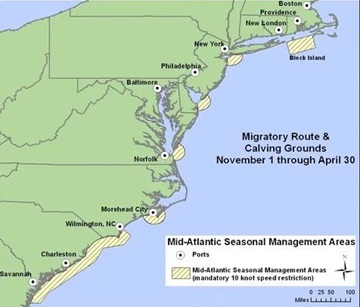 Vessel speed limits to help avoid fatal collisions between ships and one of the most endangered animals in the world that has fallen to around 350 individuals have gone back into effect off the U.S. Southeastern coast, including parts of North Carolina. The seasonal-management areas, or SMAs, limit the speed of most vessels 65 feet or longer to 10 knots, about 11.5 mph, in areas known to have heavy ship traffic that are also migratory routes or known calving grounds for the North Atlantic right whale. The go-slow zones, which run from November through April and have been in effect for more than a decade, extend about 20 nautical miles, or 23 miles, offshore and include areas around Morehead City and Beaufort and within 23 miles from shore between Wilmington and Brunswick, Ga. >>click to read<< 15:46
Vessel speed limits to help avoid fatal collisions between ships and one of the most endangered animals in the world that has fallen to around 350 individuals have gone back into effect off the U.S. Southeastern coast, including parts of North Carolina. The seasonal-management areas, or SMAs, limit the speed of most vessels 65 feet or longer to 10 knots, about 11.5 mph, in areas known to have heavy ship traffic that are also migratory routes or known calving grounds for the North Atlantic right whale. The go-slow zones, which run from November through April and have been in effect for more than a decade, extend about 20 nautical miles, or 23 miles, offshore and include areas around Morehead City and Beaufort and within 23 miles from shore between Wilmington and Brunswick, Ga. >>click to read<< 15:46
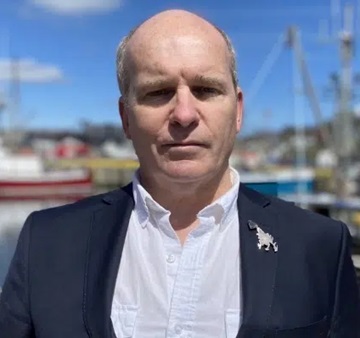
SEA-NL to Become For-Profit Fishery Co-operative
The Seaward Enterprises Association of Newfoundland and Labrador is looking to change the structure of the organization. SEA-NL has voted in favour of turning the organization into a for-profit fishery co-operative. It had previously been operating as a non-profit professional association. Executive Director Ryan Cleary says while Labrador’s industry is thriving under the co-op structure, Newfoundland’s is struggling under its current structure, so they are launching a steering committee to see what a co-op should look like on the island. >>click to read<< 11:46 >>click to read<< 11:55
Commercial Fisherman Robert Maxwell “Bob” Salter of Santa Cruz, California has passed away
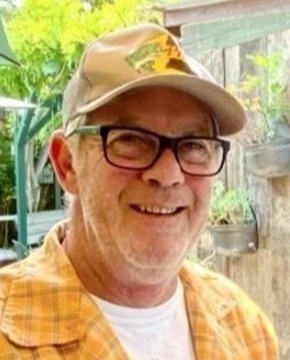 Family and friends are mourning the loss of beloved uncle and trusted friend, Bob Salter, who passed away at his Santa Cruz home with his loving family at his bedside. Bob was born in Santa Cruz to Frederick Salter and Fern Rianda Salter, he attended Delaveaga, B40, and Harbor High School. His father taught Bob the joy of fishing and love of the Sea. He grew up surfing and fishing with his brother Gary. His former boat was the Francis Jolene in the Santa Cruz Harbor. He fished for many seasons in Alaska and would visit family in Canada along the way. Bob had a lifelong career of commercial fishing and most recently fished out of Santa Cruz Harbor with Rick Ryan and his niece Bonnie Salter. >>click to read<< 10:27
Family and friends are mourning the loss of beloved uncle and trusted friend, Bob Salter, who passed away at his Santa Cruz home with his loving family at his bedside. Bob was born in Santa Cruz to Frederick Salter and Fern Rianda Salter, he attended Delaveaga, B40, and Harbor High School. His father taught Bob the joy of fishing and love of the Sea. He grew up surfing and fishing with his brother Gary. His former boat was the Francis Jolene in the Santa Cruz Harbor. He fished for many seasons in Alaska and would visit family in Canada along the way. Bob had a lifelong career of commercial fishing and most recently fished out of Santa Cruz Harbor with Rick Ryan and his niece Bonnie Salter. >>click to read<< 10:27
Norway: Cut to king crab quota recommended
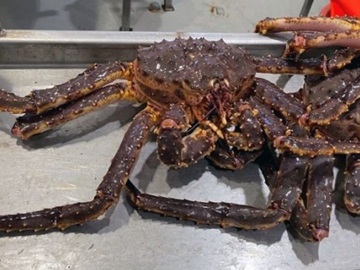 Based on the outcome of this year’s king crab survey, scientists at Norway’s Institute of Marine Research (HI) are recommending a hefty cut in the 2024 king crab quota to not more than 966 tonnes, as the survey results indicate a significant decline in the population. This means a substantial reduction compared to the quota advice for 2023, which was 2375 tonnes. ‘The result from this year’s survey shows a significant decrease in the number of crabs above the minimum target size for fisheries. The fact that we are now seeing a decline in the stock is, of course, bad news for the fishermen,’ said HI population manager for king crab, Carsten Hvingel. >>click to read<< 09:31
Based on the outcome of this year’s king crab survey, scientists at Norway’s Institute of Marine Research (HI) are recommending a hefty cut in the 2024 king crab quota to not more than 966 tonnes, as the survey results indicate a significant decline in the population. This means a substantial reduction compared to the quota advice for 2023, which was 2375 tonnes. ‘The result from this year’s survey shows a significant decrease in the number of crabs above the minimum target size for fisheries. The fact that we are now seeing a decline in the stock is, of course, bad news for the fishermen,’ said HI population manager for king crab, Carsten Hvingel. >>click to read<< 09:31
Vessel Review: Kapitan Sokolov
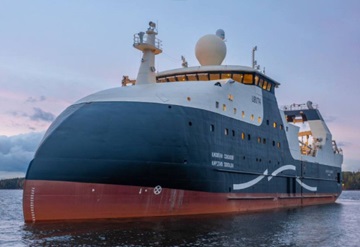 Russia’s United Shipbuilding Corporation, through its Severnaya Verf facilities in Saint Petersburg, has completed construction on a new freezer trawler ordered by local seafood company the Norebo Group. Kapitan Sokolov is the first of six Project 170701 freezer trawlers to be ordered by Norebo from Severnaya Verf. It has a steel hull, a length of 81.6 metres, a beam of 16 metres, a displacement of 5,500 tonnes, a hold capacity of nearly 1,500 tonnes of assorted fish products including fish meal and canned fish, and space for 80 crewmembers and fish processing personnel. >>click to read<< 08:34
Russia’s United Shipbuilding Corporation, through its Severnaya Verf facilities in Saint Petersburg, has completed construction on a new freezer trawler ordered by local seafood company the Norebo Group. Kapitan Sokolov is the first of six Project 170701 freezer trawlers to be ordered by Norebo from Severnaya Verf. It has a steel hull, a length of 81.6 metres, a beam of 16 metres, a displacement of 5,500 tonnes, a hold capacity of nearly 1,500 tonnes of assorted fish products including fish meal and canned fish, and space for 80 crewmembers and fish processing personnel. >>click to read<< 08:34
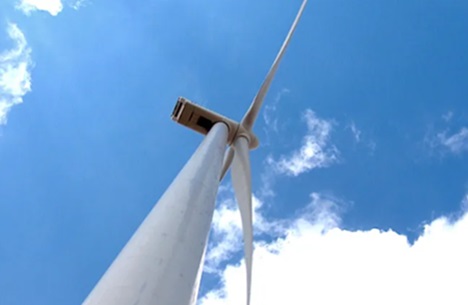
Fishermen in Maine lobbied to keep wind farms out of crucial fishing grounds. Will it happen in N.S.?
A no-compromise lobbying campaign by Maine lobster harvesters has helped keep wind farms out of a crucial lobster fishing area in the Gulf of Maine. And that has some fishermen in Nova Scotia casting an envious eye south of the border. “I’m pleased to see that happen in Maine. We’d like to see the same sort of diligence taken in Nova Scotia,” said Tommy Amirault, a fisherman from Pubnico and president of the Coldwater Lobster Association. “Maine obviously has concerns. It would be nice to 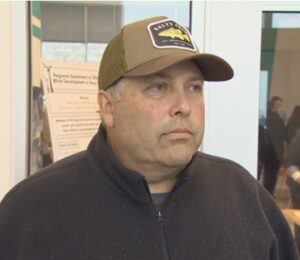 see both provincial and federal governments take our concerns into practice,” Amirault said. “We didn’t mince words that we opposed offshore wind anywhere in the Gulf of Maine. It’s one of the most productive ecosystems in the world. And we really didn’t think that this is the place to solve the renewable energy crisis,” said McCarron. In Nova Scotia, the process has just begun. He said it’s no surprise fishermen have concerns about where it happens. >>click to read<< 06:57
see both provincial and federal governments take our concerns into practice,” Amirault said. “We didn’t mince words that we opposed offshore wind anywhere in the Gulf of Maine. It’s one of the most productive ecosystems in the world. And we really didn’t think that this is the place to solve the renewable energy crisis,” said McCarron. In Nova Scotia, the process has just begun. He said it’s no surprise fishermen have concerns about where it happens. >>click to read<< 06:57
OPINION: North Pacific Fishery Management Council is acting to reduce bycatch
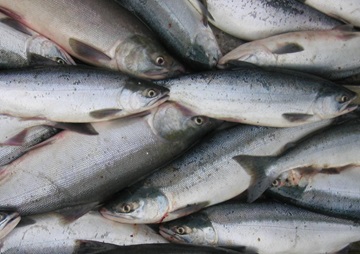 In a recent opinion piece, Brooke Woods, Linda Behnken and Nanci Morris Lyon stated, “Federal fisheries off Alaska are managed via the dictates of the North Pacific Fishery Management Council (NPFMC), which has done little to address the trawl fleet’s enormous bycatch of species immeasurably important to Alaskans.” Nothing could be further from the truth The council adopted hard caps for chinook salmon in the Bering Sea trawl pollock fisheries that vary depending upon the expected returns to western Alaska rivers. When expected returns are low, the caps are adjusted downward. Additionally, the fishing industry has stepped forward to implement chinook salmon avoidance measures that hold each vessel accountable for limiting bycatch to below the caps. In fact, the fleet is well below their caps, recognizing the need to rebuild these stocks. >>click to read<< 15:55
In a recent opinion piece, Brooke Woods, Linda Behnken and Nanci Morris Lyon stated, “Federal fisheries off Alaska are managed via the dictates of the North Pacific Fishery Management Council (NPFMC), which has done little to address the trawl fleet’s enormous bycatch of species immeasurably important to Alaskans.” Nothing could be further from the truth The council adopted hard caps for chinook salmon in the Bering Sea trawl pollock fisheries that vary depending upon the expected returns to western Alaska rivers. When expected returns are low, the caps are adjusted downward. Additionally, the fishing industry has stepped forward to implement chinook salmon avoidance measures that hold each vessel accountable for limiting bycatch to below the caps. In fact, the fleet is well below their caps, recognizing the need to rebuild these stocks. >>click to read<< 15:55
Doug Vincent-Lang
First Nations seek salmon return to Columbia Basin in new treaty with U.S.
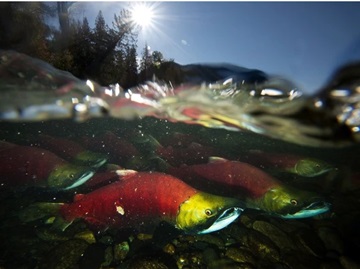 Representatives from the Ktunaxa and Syilx Okanagan nations say they continue to bring up salmon restoration in negotiations for a modern Columbia River Treaty and will not stop until a solution can be reached within or outside a new agreement. The U.S.-Canada treaty regulates the cross-border Columbia River to prevent flooding and generate hydro power. A key component of the 62-year-old treaty is set to expire in September 2024, lending urgency to the ongoing talks. “I think what we are doing in the fight to bring salmon back is vital to us moving forward,” said Lower Similkameen Indian Band Chief Keith Crow, who is a member on the Syilx Okanagan Nation’s Chiefs Executive Council and the Nation’s lead in the Columbia River Treaty talks. >>click to read<< 14:25
Representatives from the Ktunaxa and Syilx Okanagan nations say they continue to bring up salmon restoration in negotiations for a modern Columbia River Treaty and will not stop until a solution can be reached within or outside a new agreement. The U.S.-Canada treaty regulates the cross-border Columbia River to prevent flooding and generate hydro power. A key component of the 62-year-old treaty is set to expire in September 2024, lending urgency to the ongoing talks. “I think what we are doing in the fight to bring salmon back is vital to us moving forward,” said Lower Similkameen Indian Band Chief Keith Crow, who is a member on the Syilx Okanagan Nation’s Chiefs Executive Council and the Nation’s lead in the Columbia River Treaty talks. >>click to read<< 14:25
U.S. regulators will review car-tire chemical that kills salmon, upon request from West Coast tribes
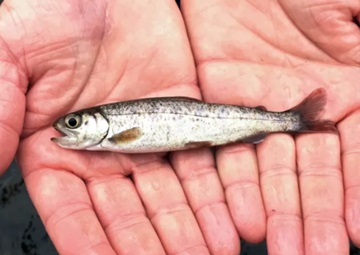 U.S. regulators say they will review the use of a chemical found in almost every tire after a petition from West Coast Native American tribes that want it banned because it kills salmon as they return from the ocean to their natal streams to spawn. The Yurok tribe in California and the Port Gamble S’Klallam and Puyallup tribes in Washington asked the Environmental Protection Agency to prohibit the rubber preservative 6PPD earlier this year, saying it kills fish — especially coho salmon — when rains wash it from roadways into rivers. Washington, Oregon, Vermont, Rhode Island and Connecticut also wrote the EPA, citing the chemical’s “unreasonable threat” to their waters and fisheries. >>click to read<< 10:14
U.S. regulators say they will review the use of a chemical found in almost every tire after a petition from West Coast Native American tribes that want it banned because it kills salmon as they return from the ocean to their natal streams to spawn. The Yurok tribe in California and the Port Gamble S’Klallam and Puyallup tribes in Washington asked the Environmental Protection Agency to prohibit the rubber preservative 6PPD earlier this year, saying it kills fish — especially coho salmon — when rains wash it from roadways into rivers. Washington, Oregon, Vermont, Rhode Island and Connecticut also wrote the EPA, citing the chemical’s “unreasonable threat” to their waters and fisheries. >>click to read<< 10:14
A business in crisis
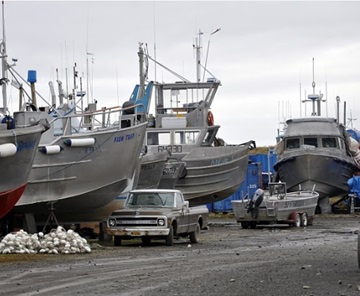 After years of choking on record runs of Bristol Bay sockeye salmon and near-record runs of heavily farmed, low-value pink salmon, the Alaska fishing industry is in chaos with processors now pleading for more government subsidies and coddled commercial fishermen demanding yet more disaster aid. One could blame global warming, which has led to historically unprecedented harvests of Alaska salmon despite whatever nonsense to the contrary the mainstream media might have reported, but the industry’s problems are far more complex than just trying to sell high-priced seafood in Western markets where the sales of animal protein are dominated by chicken, beef and pork. Some of the industry’s issues here are rooted in its long history. For most of the years after commercial fishing began in Alaska in the late 1800s, the business dealt almost wholly in canned salmon. >>click to read<< 08:41
After years of choking on record runs of Bristol Bay sockeye salmon and near-record runs of heavily farmed, low-value pink salmon, the Alaska fishing industry is in chaos with processors now pleading for more government subsidies and coddled commercial fishermen demanding yet more disaster aid. One could blame global warming, which has led to historically unprecedented harvests of Alaska salmon despite whatever nonsense to the contrary the mainstream media might have reported, but the industry’s problems are far more complex than just trying to sell high-priced seafood in Western markets where the sales of animal protein are dominated by chicken, beef and pork. Some of the industry’s issues here are rooted in its long history. For most of the years after commercial fishing began in Alaska in the late 1800s, the business dealt almost wholly in canned salmon. >>click to read<< 08:41






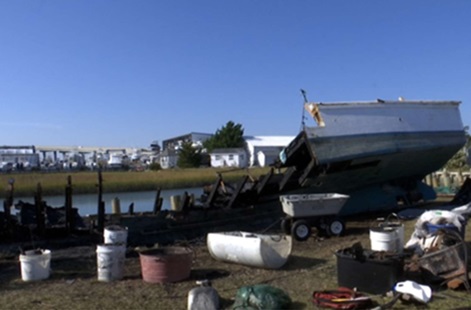
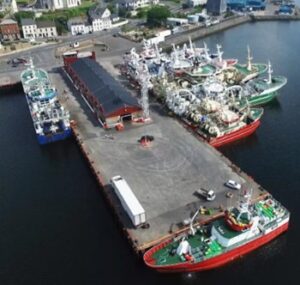
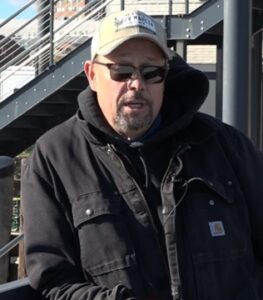
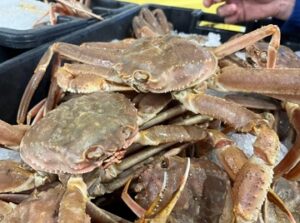
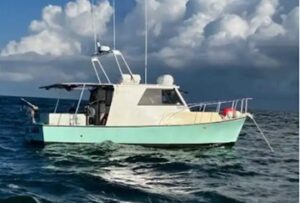





























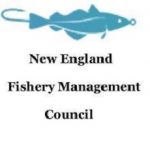


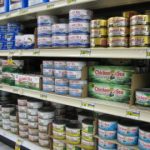
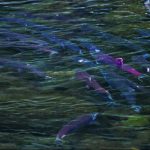

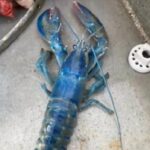




Stevenson: It’s time for public comments on offshore wind
Share this post